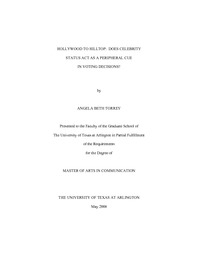
ATTENTION: The works hosted here are being migrated to a new repository that will consolidate resources, improve discoverability, and better show UTA's research impact on the global community. We will update authors as the migration progresses. Please see MavMatrix for more information.
Show simple item record
| dc.contributor.author | Torrey, Angela Beth | en_US |
| dc.date.accessioned | 2008-08-08T02:31:10Z | |
| dc.date.available | 2008-08-08T02:31:10Z | |
| dc.date.issued | 2008-08-08T02:31:10Z | |
| dc.date.submitted | April 2008 | en_US |
| dc.identifier.other | DISS-2027 | en_US |
| dc.identifier.uri | http://hdl.handle.net/10106/940 | |
| dc.description.abstract | Given the increase in Hollywood celebrities running for political office and the young adult population's cultural tendency to glorify the lives of celebrities, this research explored tenets of the Elaboration Likelihood Model (ELM) to determine whether celebrity status acts as a peripheral cue that makes thoughtful engagement of political candidates and their stances unlikely in young adult's voting decisions. Indeed, the results of this study found that celebrity status does serve as such a cue, in many cases making it more likely that a celebrity would be voted for and liked more, when compared to an otherwise-comparable candidate.
Further applying ELM to celebrity status as a peripheral cue, the study examined what, if any, differences existed between participants who had a high versus low need for cognition as well as differing levels of political involvement. However, the findings do not show that need for cognition or level of political involvement significantly increased the use of celebrity status as a cue. | en_US |
| dc.description.sponsorship | Zwarun, Lara | en_US |
| dc.language.iso | EN | en_US |
| dc.publisher | Communication | en_US |
| dc.title | Hollywood To Hilltop: Does Celebrity Status Act As A Peripheral Cue In Voting Decisions | en_US |
| dc.type | M.A. | en_US |
| dc.contributor.committeeChair | Zwarun, Lara | en_US |
| dc.degree.department | Communication | en_US |
| dc.degree.discipline | Communication | en_US |
| dc.degree.grantor | University of Texas at Arlington | en_US |
| dc.degree.level | masters | en_US |
| dc.degree.name | M.A. | en_US |
Files in this item
- Name:
- umi-uta-2027.pdf
- Size:
- 636.3Kb
- Format:
- PDF
This item appears in the following Collection(s)
Show simple item record


